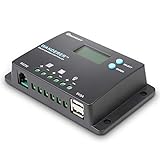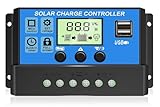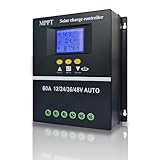Solar charger controllers are essential components of any solar power system, maximizing the efficiency and longevity of your solar panels and batteries. Finding the best solar charger controllers is crucial for ensuring optimal performance and protection of your investment. In this comprehensive guide, we will explore the top-rated solar charger controllers available in the market, providing detailed reviews and insightful buying tips to help you make an informed decision.
Achieving the optimal balance between performance, durability, and cost-effectiveness is key when selecting the best solar charger controllers for your specific needs. By equipping yourself with the right information and understanding the features to look for, you can enhance the overall effectiveness and reliability of your solar energy setup. Join us as we delve into the world of the best solar charger controllers to help you harness the power of the sun efficiently and sustainably.
We’ll cover the best solar charger controllers later in this article. Meanwhile, feel free to check out these related products on Amazon:
Last update on 2025-12-14 / #Ad / Affiliate links / Images from Amazon Product Advertising API
Understanding Solar Charger Controllers
Solar charger controllers, also known as solar charge regulators, are essential components of a solar power system. These controllers regulate the voltage and current coming from solar panels to ensure the batteries are charged efficiently and safely. They help prevent overcharging, which can damage the batteries, and also protect them from deep discharge, prolonging their lifespan.
There are different types of solar charger controllers available, including pulse width modulation (PWM) and maximum power point tracking (MPPT) controllers. PWM controllers are more affordable and work well for smaller systems with less complex energy needs. On the other hand, MPPT controllers are more sophisticated and efficient, making them ideal for larger solar power systems or situations where maximizing energy output is crucial.
When selecting a solar charger controller, it’s essential to consider factors such as system voltage, maximum input current, and the type of battery being used. Choosing the right controller ensures optimal performance and longevity of the solar power system. Regular maintenance and monitoring of the controller are also important to ensure it operates effectively and protects the batteries from potential damage.
Best Solar Charger Controllers – Reviewed
01. Renogy Wanderer 10A
Featuring a compact design, the Renogy Wanderer 10A is a reliable solar charge controller that effortlessly manages your solar system’s power output. With a maximum voltage of 12V, it is suitable for small-scale off-grid applications. The user-friendly LCD display provides real-time monitoring of voltage and amperage, ensuring optimal performance.
Despite its modest size, the Wanderer 10A is equipped with multiple protection features, including overcharge, short circuit, and reverse polarity protection. Its intuitive interface and durable construction make it a practical choice for those looking to efficiently regulate their solar power system.
02. Victron Energy SmartSolar MPPT 100/30
Featuring advanced Maximum Power Point Tracking technology, the Victron Energy SmartSolar MPPT 100/30 is a top-tier solar charge controller. Its efficient design maximizes solar energy harvest, optimizing overall system performance. With a user-friendly interface and Bluetooth connectivity, monitoring and configuring the controller is easy through the VictronConnect app.
This compact yet powerful controller is ideal for both residential and commercial solar applications. Its robust build quality ensures reliability and longevity, making it a cost-effective choice for those seeking to enhance their solar power systems. The Victron Energy SmartSolar MPPT 100/30 truly delivers outstanding performance in a sleek package.
03. EPEVER MPPT Solar Charge Controller 40A
Designed for efficient solar power utilization, the EPEVER MPPT Solar Charge Controller 40A is a top-notch solution for optimizing energy output. Its Maximum Power Point Tracking technology ensures maximum conversion efficiency, effectively harnessing solar energy for charging batteries. With a robust build and advanced features like temperature compensation and auto-detection of battery voltage, this controller offers reliable performance and protection for your solar system.
Users appreciate the user-friendly interface and the comprehensive LCD display which provides real-time data on the charging process. The EPEVER MPPT Solar Charge Controller 40A is a smart investment for those seeking a high-quality and dependable solution to manage their solar power system with ease.
“The Importance of Solar Charger Controllers
People need to buy solar charger controllers to efficiently manage the charging process of their solar panels. These devices are essential for preventing overcharging and ensuring that the batteries connected to the solar panels are properly maintained. By regulating the flow of electricity from the solar panels to the batteries, solar charger controllers help maximize the lifespan and performance of the entire solar power system.
Investing in the best solar charger controllers is crucial for optimizing the efficiency of a solar energy system. These controllers come equipped with advanced features such as temperature compensation, battery type selection, and adjustable charging parameters. By choosing a high-quality solar charger controller, users can effectively harness the power of the sun to generate clean and reliable energy for their off-grid or grid-tied applications.
Furthermore, solar charger controllers give users peace of mind by safeguarding their solar power system against potential damage caused by fluctuating power levels or adverse weather conditions. With the right controller in place, individuals can enjoy a steady and uninterrupted supply of renewable energy while protecting their equipment from harm. When it comes to ensuring the smooth operation and longevity of a solar energy setup, purchasing the best solar charger controllers is an investment worth making.
Solar Charger Controller Buying Guide
Key factors to consider when choosing a solar charger controller include the system voltage compatibility, maximum input current rating, charging algorithm, display options, and protection features. Selecting the right controller based on these critical factors can ensure optimal performance and protection for your solar charging system.
Type Of Solar Panel Compatibility
One important aspect to consider when choosing a solar charger controller is the type of solar panel compatibility. Not all solar charger controllers are compatible with all types of solar panels, which can affect the efficiency and effectiveness of the overall solar power system. Different solar panels may have varying voltage and current outputs, and selecting a controller that is specifically designed to work with the type of solar panel you have can optimize the charging process and extend the lifespan of both the panels and the batteries.
Mismatched compatibility between the solar panel and charger controller can lead to issues such as undercharging or overcharging, which can impact the battery performance and overall system reliability. By ensuring that the controller is compatible with the specific type of solar panel being used, individuals can maximize the energy output, improve system functionality, and ultimately enhance the overall effectiveness and sustainability of their solar power setup.
Maximum Solar Input Voltage And Current Capacity
One should consider the maximum solar input voltage and current capacity when selecting solar charger controllers to ensure compatibility with the solar panels being used. This factor determines the maximum power output that the controller can handle effectively, preventing damage from overloading. By matching the solar input specifications with the controller’s capabilities, users can optimize the efficiency and performance of their solar power system while also ensuring the safety and longevity of their equipment.
Battery Compatibility And Charging Algorithm
One should consider battery compatibility and charging algorithm when choosing solar charger controllers to ensure efficient and safe charging of the batteries. Different batteries have varying voltage and capacity requirements, and a mismatch can lead to overcharging or undercharging, shortening the battery lifespan. The charging algorithm of the controller determines how the battery is charged, protecting it from damage and optimizing its performance. Choosing a controller that is compatible with your specific batteries will help maximize the effectiveness of your solar power system.
Display And Monitoring Features
Display and monitoring features play a crucial role in choosing the right solar charger controller as they provide real-time information about the system’s performance, battery status, and energy production. These features allow users to monitor the charging progress, voltage levels, and problem diagnostics, ensuring efficient operation and optimal power output. By having access to this important data, users can troubleshoot issues promptly, make informed decisions for system optimization, and maximize the overall effectiveness of their solar power setup.
Types Of Solar Charger Controllers
When it comes to choosing the right solar charger controller for your specific needs, it’s essential to understand the different types available in the market. The main types of solar charger controllers are PWM (Pulse Width Modulation) and MPPT (Maximum Power Point Tracking).
PWM controllers are the more traditional option and are generally more budget-friendly. They work by regulating the flow of energy from the solar panels to the batteries, ensuring they are not overcharged. While PWM controllers are effective, they are best suited for smaller solar power systems with less complex energy needs.
On the other hand, MPPT controllers are more advanced and efficient, making them ideal for larger solar power systems with higher energy demands. MPPT controllers can maximize the power output from the solar panels by adjusting the voltage and current to match the battery’s requirements, resulting in better overall performance and energy efficiency. These controllers are more expensive upfront but can lead to higher energy savings in the long run.
Features To Consider In Solar Charger Controllers
When choosing a solar charger controller, there are several key features to consider to ensure optimal performance and efficiency. Firstly, look for controllers with ample capacity to accommodate the wattage of your solar panels. Having a controller with a capacity higher than the total wattage of your panels is important for effective energy conversion and regulation. Additionally, consider controllers with multiple charging stages such as bulk, absorption, and float to ensure that your batteries are properly maintained and charged.
Another crucial feature to consider is the type of system compatibility offered by the solar charger controller. Make sure that the controller is compatible with the type of battery and solar panel configuration you have, whether it be lead-acid, lithium-ion, or other types of batteries. Moreover, look for controllers with advanced monitoring and protection features such as temperature compensation, overcharge protection, and short circuit protection to safeguard your system from potential damage or inefficiencies.
Lastly, consider the display and interface features of the solar charger controller. Opt for controllers with user-friendly interfaces, clear displays, and informative indicators that make it easy to monitor and adjust settings. Some controllers also offer remote monitoring capabilities through smartphone apps or software, providing convenience and real-time access to system performance data.
FAQ
What Are The Key Features To Consider When Choosing A Solar Charger Controller?
When selecting a solar charger controller, key features to consider include the maximum input voltage and current rating to ensure compatibility with your solar panels. Additionally, look for controllers with temperature compensation and adjustable settings for charging parameters to optimize performance. It is also important to choose a controller with sufficient power handling capacity and protection features such as overcharge, over-discharge, and short circuit protection to safeguard your solar system.
How Do Solar Charger Controllers Protect Batteries From Overcharging And Discharging?
Solar charger controllers protect batteries from overcharging by monitoring the voltage levels and cutting off the charging process once the battery reaches full capacity. This prevents excess energy from damaging the battery.
To prevent batteries from over-discharging, solar charger controllers monitor the battery’s voltage levels and disconnect the load when the battery reaches a predetermined low voltage threshold. This ensures the battery remains within a safe operating range and extends its lifespan.
Can I Use A Solar Charger Controller With Any Type Of Solar Panel Setup?
No, it is important to match the solar charger controller with the specific solar panel setup to ensure compatibility and optimal performance. Different types of solar panels (e.g., monocrystalline, polycrystalline, thin-film) have varying voltage and current characteristics that may require specific features in a solar charger controller. Make sure to consult the manufacturer’s recommendations or seek professional advice to select the appropriate controller for your solar panel setup.
Are Mppt Or Pwm Solar Charger Controllers More Suitable For Different Solar Power Systems?
MPPT solar charger controllers are generally more suitable for larger solar power systems where maximizing power output is crucial. They are more efficient in converting solar energy into electrical power and can handle varying weather conditions. PWM controllers, on the other hand, are simpler and more cost-effective, making them suitable for smaller systems with predictable sun exposure. It is important to choose the controller based on the specific requirements and size of the solar power system.
What Are Some Common Installation Tips For Solar Charger Controllers?
When installing solar charger controllers, ensure proper polarity connections. Place the controller close to the battery to minimize voltage drop. Secure the controller in a ventilated area and away from heat sources. Use appropriate wire sizes for connections to avoid overheating. Additionally, follow manufacturer guidelines for programming and settings to maximize efficiency. Regularly inspect and maintain connections and components for optimal performance.
Conclusion
In choosing the best solar charger controllers, it is crucial to prioritize efficiency and durability to maximize the performance of your solar panel system. The controllers reviewed here offer innovative features and reliable performance to ensure optimal charging and protection for your batteries. With the advancements in technology and the increasing popularity of solar energy, investing in the best solar charger controller is a wise decision to make the most of your solar power system. By selecting a high-quality controller, you can effectively manage and regulate the energy flow from your solar panels, enhancing the overall efficiency and longevity of your solar-powered setup.
Upgrade your solar charging experience with one of the best solar charger controllers featured in this guide, and enjoy a seamless, eco-friendly energy solution for all your power needs. Make a smart investment in the best solar charger controller to optimize your energy production and storage capabilities, ultimately leading to significant savings and a more sustainable lifestyle. Choose the right controller for your specific needs and harness the power of the sun efficiently and effectively for years to come.



![[Upgraded] 30A Solar Charge Controller, 12V/ 24V Solar Panel Regulator with...](https://m.media-amazon.com/images/I/41opvkWthjL._SL160_.jpg)
